Related Research Articles
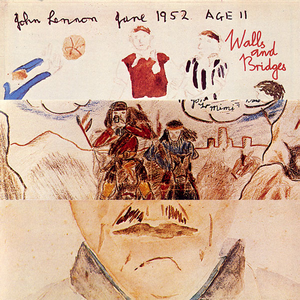
Walls and Bridges is the fifth solo studio album by English musician John Lennon. It was issued by Apple Records on 26 September 1974 in the United States and on 4 October in the United Kingdom. Written, recorded and released during his 18-month separation from Yoko Ono, the album captured Lennon in the midst of his "Lost Weekend". Walls and Bridges was an American number-one album on both the Billboard and Record World charts and included two hit singles, "Whatever Gets You thru the Night" and "#9 Dream". The first of these was Lennon's first number-one hit in the United States as a solo artist, and his only solo chart-topping single in either the US or Britain during his lifetime.
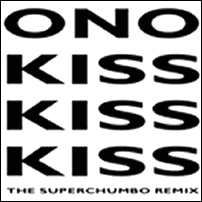
"Kiss Kiss Kiss" is a song by Japanese singer Yoko Ono. It was originally released on Double Fantasy, her joint album with John Lennon, as well as on the B-side of his "(Just Like) Starting Over" single. The disco and new wave-influenced song features Ono gasping heavily and appearing to reach orgasm.
"Surprise, Surprise " is a song written by John Lennon that was first released on his 1974 album Walls and Bridges. Elton John contributes harmony vocals to the song.
"Remember" is a song by English rock musician John Lennon from his 1970 album John Lennon/Plastic Ono Band.
"Well Well Well" is a song by English musician John Lennon from his 1970 album John Lennon/Plastic Ono Band. The eighth and longest track on the album, "Well Well Well" features an aggressive guitar sound, screaming vocals and a pounding backing track.
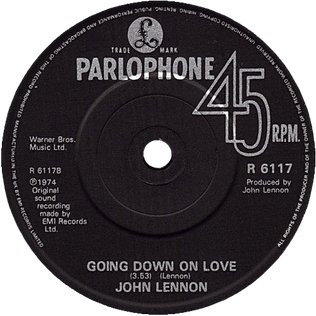
"Going Down on Love" is a song by John Lennon, released as the first track on his 1974 album Walls and Bridges. It was also released as the B-side of Lennon's "Jealous Guy" single in 1985.
"Old Dirt Road" is a song written by John Lennon and Harry Nilsson, first released on Lennon's 1974 album Walls and Bridges. Nilsson later recorded the song on his 1980 album Flash Harry.

"I'm Losing You" is a song written by John Lennon and released on his 1980 album Double Fantasy. It was written in Bermuda in June 1980, after several attempts by Lennon to call his wife, Yoko Ono, who remained in New York. The song is also available on the 1982 compilation The John Lennon Collection, the 1998 boxset John Lennon Anthology, the one disc compilation Wonsaponatime, the 2005 two disc compilation Working Class Hero: The Definitive Lennon and in 2010 for the Gimme Some Truth album. The song was also featured in the 2005 musical Lennon.
"Aisumasen (I'm Sorry)" is a song written by John Lennon released on his 1973 album Mind Games. The song is included on the 1990 box set Lennon.
"Nobody Loves You (When You're Down and Out)" is a song written by John Lennon released on his 1974 album Walls and Bridges. The song is included on the 1986 compilation Menlove Ave., the 1990 boxset Lennon, the 1998 boxset John Lennon Anthology, the 2005 two-disc compilation Working Class Hero: The Definitive Lennon, and the 2010 boxset Gimme Some Truth.

"Sisters, O Sisters", also known as "Sisters O Sisters", is a song written by Yoko Ono that first appeared on John Lennon's and Yoko Ono's 1972 Plastic Ono Band album Some Time in New York City, backed by Elephant's Memory. It was also released as the b-side to the couple's "Woman Is the Nigger of the World" single. It has been covered by a number of artists, including Le Tigre and Tater Totz.
"Born in a Prison" is a song written by Yoko Ono and first released on her 1972 album with John Lennon Some Time in New York City as part of their Plastic Ono Band project.
"New York City" is a song written by John Lennon that was first released on Lennon's and Yoko Ono's 1972 Plastic Ono Band album Some Time in New York City.

"What You Got" is a song written by John Lennon that was first released on his 1974 album Walls and Bridges. It was later released as the B-side to his top 10 #9 Dream single.
"Bless You" is a song written by John Lennon that was first released on his 1974 album Walls and Bridges. It is a ballad expressing his love for his wife Yoko Ono, even though they were separated at the time. Alternative versions appeared on the compilation albums Menlove Ave. and John Lennon Anthology
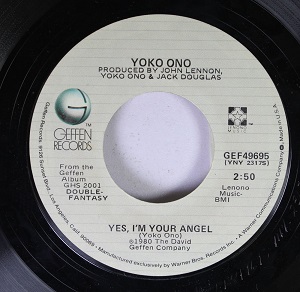
"Yes, I'm Your Angel", also known as "I'm Your Angel", is a song written by Yoko Ono that was first released on Ono's and John Lennon's 1980 album Double Fantasy. It was later released as the b-side of Lennon's single "Watching the Wheels." The initial release of Double Fantasy used the title "I'm Your Angel" but later releases as well as the single used the title "Yes, I'm Your Angel."
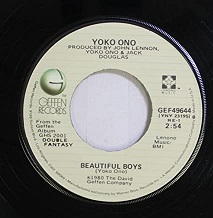
"Beautiful Boys" is a song written by Yoko Ono that was first released on Ono's and John Lennon's 1980 album Double Fantasy. It was later released as the B-side of Lennon's #1 single "Woman."

"Move Over Ms. L" is a song written by John Lennon. It was originally intended to be released on his 1974 album Walls and Bridges but was left off shortly before the album release, and was eventually released as the b-side to Lennon's "Stand by Me" single. In the interim it was released by Keith Moon on his album Two Sides of the Moon. Moon also released it as the B-side of his "Solid Gold" single.
"Sunday Bloody Sunday" is a song written by John Lennon and Yoko Ono that was first released on their 1972 Plastic Ono Band album with Elephant's Memory, Some Time in New York City. The song addresses the Bloody Sunday massacre of 1972 and is one of two on the album that addresses the contemporary Northern Ireland conflict, "The Luck of the Irish" being the other.

"Beef Jerky" is an instrumental written by John Lennon that was released on his 1974 album Walls and Bridges and also as the b-side of the lead single from that album, the #1 hit "Whatever Gets You thru the Night."
References
- 1 2 3 4 5 Blaney, J. (2007). Lennon and McCartney: together alone: a critical discography of their solo work. Jawbone Press. p. 94. ISBN 978-1-906002-02-2.
- 1 2 3 "Scared". The Beatles Bible. 16 August 2010. Retrieved 2023-01-03.
- 1 2 3 4 Rogan, Johnny (2010). Lennon: The Albums. Calidore. ISBN 9780857124388.
- 1 2 3 4 Rogan, Johnny (1997). The Complete Guide to the Music of John Lennon. Omnibus Press. pp. 90, 143. ISBN 0711955999.
- 1 2 3 4 5 Spizer, Bruce (2005). The Beatles Solo on Apple Records. 498 Productions. pp. 86–87. ISBN 0966264959.
- 1 2 3 4 Du Noyer, Paul (1999). John Lennon: Whatever Gets You Through the Night. Thunder's Mouth Press. p. 89. ISBN 1560252103.
- 1 2 3 4 5 6 Urish, Ben; Bielen, Ken (2007). The Words and Music of John Lennon. Praeger. p. 59. ISBN 9780275991807.
- 1 2 Rodriguez, Robert (2010). Fab Four FAQ 2.0: The Beatles' Solo Years 1970–1980. Hal Leonard. p. 164. ISBN 9780879309688.
- ↑ Gerson, Ben (21 November 1974). "Walls and Bridges". Rolling Stone . Retrieved 2022-01-02.
- ↑ Metzger, John (14 April 2011). "John Lennon: Walls and Bridges". The Music Box. Retrieved 2023-01-03.
- ↑ Gallucci, Michael (26 September 2015). "Why John Lennon Sometimes Sounded so Lost on 'Walls and Bridges'" . Retrieved 2023-01-03.
- 1 2 Madinger, C. & Easter, M. (2000). Eight Arms to Hold You. 44.1 Productions. p. 100. ISBN 0-615-11724-4.
- ↑ John Lennon – Walls And Bridges, October 2014, retrieved 2023-11-18